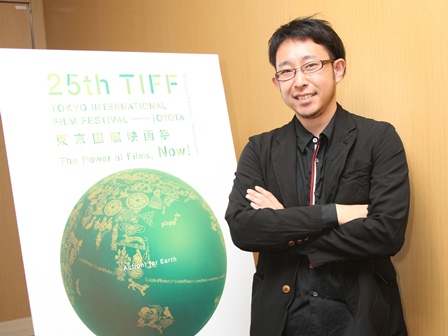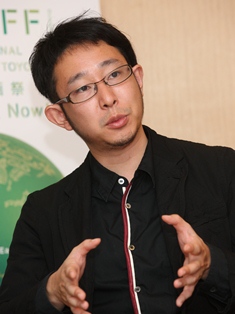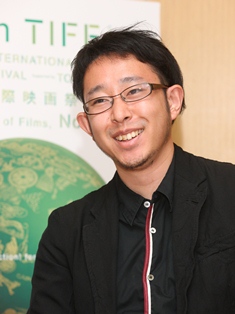Interview with Director Shoji Toyama (”Our Night is Not Long“)

The Nobel Prize-winning Polish poet Wislawa Szymborska, who died this past February, has had an uncommon influence on movie directors. Her poem “Love At First Sight” has already inspired not one but two well-known films, Krzystof Kieslowski’s “Three Colors: Red” and Johnnie To’s “Turn Left, Turn Right.” Her poetry is also the inspiration for Shoji Toyama’s brand new movie “Our Night Is Not Long,” specifically what she has to say about the sea as a metaphor for life and death.
“I was brought up watching the ocean, which was all around me,” says the filmmaker when asked why much of the film, structured as a road movie, takes place near the sea. In fact, he filmed these scenes in the vicinity of his hometown on Amakusa Island in Kumamoto Prefecture. “Do you know Sadako, the character from the ‘Ring’ movies? The real person on whom Sadako was modeled lived by the sea in this area, which is called Shiranui. It has a very long history, a lot of which involves legends and stories about life and death. I always thought you could really feel the dynamic between life and death there. There are many spirits from the sea.”

The film focuses on one woman, played by Yoomi Tamai, who struggles to understand a great loss in her life. Her dreams are troubled and the night is a country she would rather not visit. On a whim she steals a car in Tokyo after discarding most of the possessions she has with her and just starts driving with no destination and no discernible engagement in her actions. Toyama keeps the viewer off balance with his flexible concept of time, which seems to flow in several directions at once. In some scenes, the woman ponders the future as if it’s already happened and the past as if it could somehow be changed.
“She’s trying to understand the loss,” Toyama says, and points to a video showing friends congratulating her on her upcoming wedding. “She studies these videos in order to figure out what happened, but in a way she’s blaming herself. She can’t help it. Life can be absurd, many things can happen. I continually use blackouts between scenes. These symbolize her change in feeling.”

As in any road movie, the protagonist encounters strangers along the way, but usually such encounters offer enlightenment. For Toyama, these individuals–a blind girl reciting Shakespeare on the shore, a voluble incinerator worker carrying a broken typewriter he’s found in the road, a young man whose father is about to die–are used as mirrors that reflect the woman’s emotional state at any given time. “Her feelings are meant to match her surroundings,” he says. “The concept of ‘night’ is a very important factor in the film, so there is that blind girl, who wants to fall in love but can’t. She talks to the sea to become more courageous, a little more independent. I love road movies but because of my personality I didn’t want to make a stereotypical one. I don’t think road movies need to offer clear answers in the end, so we aren’t really supposed to know what happens to the woman. Maybe her life changes completely, but we’ll never know.”
This uncertainty is at the heart of Toyama’s view of life and death as something we have no real control over. “People should confront life based on what’s happening right there in front of them,” he says. At the beginning of her journey, the woman starts throwing possessions away and then “picks up things that have been discarded by others,” thus reinventing herself in the process. Toyama says she’s reacting to the moment, and feels this is a natural state of being. “Many of the actors in the film are not professionals,” he points out. “They’re just playing out their daily lives as they happen, because you have to accept what happens to you. To me that’s the most important thing.”
Though the night scenes have a hallucinogenic, anxious mood, Toyama admits he prefers nighttime to daytime. “I like to walk at night,” he says with a slightly uncomfortable laugh. “At that time the city is sleeping, but there are always a few people who are still awake. Maybe someone is taking a shower, and then you smell it. It can be very erotic, because your senses pick up on things they wouldn’t normally notice in the daytime.”
(Text by Philip Brasor)



















